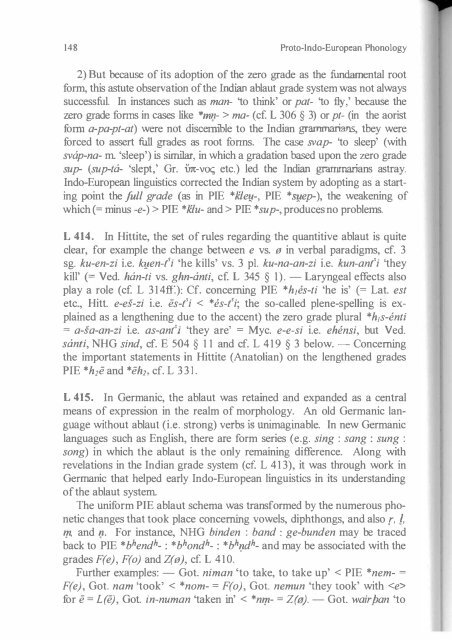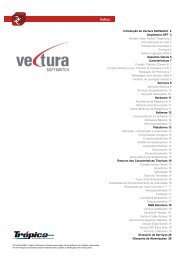You also want an ePaper? Increase the reach of your titles
YUMPU automatically turns print PDFs into web optimized ePapers that Google loves.
148 Proto-lndo-European PhonologyLarger Phonetic Unities1492) But because <strong>of</strong> its adoption <strong>of</strong> the zero grade as the fundamental rootform, this astute observation <strong>of</strong> the Indian ablaut grade system was not alwayssuccessful. In instances such as man- 'to think' or pat- 'to fly,' because thezero grade fonns in cases like *lnl)- > ma- (cC L 306 § 3) or pt- (in the aoristfo rm a-pa-pt-at) were not discermble to the Indian grammarians, tbey wereforced to assert full grades as root fonns.The case svap- 'to sleep' (withsvap-na- m 'sleep') is similar, in which a gradation based upon the zero gradesup- (sup-ta- 'slept,' Gr. ilrr-vo PIE *Jilu- and > PIE *sup-, produces no problems.L 414. In Hittite, the set <strong>of</strong> mles regarding the quantitive ablaut is quiteclear, for example the change between e vs. 0 in verbal paradigms, cf. 3sg. ku-en-zi i.e. lajen-t'i 'he kills' vs. 3 pI. ku-na-an-zi i.e. kun-ant'i 'theykill' (=Ved. han-ti vs. ghn-anti, cC L 345 § I). - Laryngeal effects alsoplay a role (cC L 314ff.): Cf. concerning PIE *"Ies-ti 'he is' (=Lat. estetc., Hitt. e-es-zi i.e. es-t'i < *es-t'i; the so-called plene-spelling is explainedas a lengthening due to the accent) the zero grade plural ""Is-enti= a-sa-an-zi i.e. as-ant'i 'they are' = Myc. e-e-si i.e. e"ensi, but Ved.santi, NHG sind, cf. E 504 § II and cf. L 419 § 3 below. - Concerningthe important statements in Hittite (Anatolian) on the lengthened gradesPIE *",e and *eh" cf. L 331.L 415. In Germanic, the ablaut was retained and expanded as a centralmeans <strong>of</strong> expression in the realm <strong>of</strong> morphology.An old Germanic languagewithout ablaut (i.e. strong) verbs is unimaginable. In new Germaniclanguages such as English, there are form series (e.g. sing : sang : sung :song) in which the ablaut is the only remaining difference. Along withrevelations in the Indian grade system (cf. L 413), it was through work inGermanic that helped early Indo-European linguistics in its understanding<strong>of</strong> the ablaut systemThe uniform PIE ablaut schema was transformed by the numerous phoneticchanges that took place concerning vowels, diphthongs, and also r. /.l'[l. and I). For instance, NHG binden : band : ge-bunden may be tracedback to PIE * bhendh- : * bhondh_ : * bh1Jdh- and may be associated with thegrades F(e), F(o) and Z(o), cf. L 410.Further examples: - Got. niman 'to take, to take up' < PIE *nem- =F(e), Got. nam 'took' < *nom- = F(o), Got. nemun 'they took' with fo r e = L(e) , Got. in-numan 'taken in' < *nl'[l- = ZM. - Got. wairjJan 'tobecome' < PIE "yert- = F(e), warjJ 'became' < *'Jort- = F(o), waurjJun'they became' < *lJrl- = Z(o) (concerning Gothic -or- < Proto-Germ.*-ur-, cf. L 208). - Got. tiuhan 'to pull, to lead' < PIE *del}k- = F(e),ga-tauhans part. 'pulled' < *duk- = Z(o) (concerning Gothic -oh- < Germ.*-uh-, cf. L 208).The various Germanic continuations <strong>of</strong> the uniform PIE ablaut typessuch as *er *or *r or *el} *oy *u are the major reason fo r the differencesbetween the first five series <strong>of</strong> strong verbs in the Old Germanic languages.L 416. Many instances <strong>of</strong> inherited ablauts are also attested in the Balticand Slavic languages: - Cf. Lith. tew, OCS teko 'I run, flow' = F(e);Lith. takas m 'canal, pipe, barrel,' OCS toh 'run, flow, threshing floor'F(o) ; Lith. leU 'deep place in a river,' OCS lex" 'ran' < *Iek[-s-] = L(e) ;Russ.-CS lakati 'to drive an animal' = L(o) . - Cf. Lith. merifti 'to starve,'OCS mreli 'to die' < PIE *mer- = F(e) ; Lith. maras 'epidemic,' OCSmoro 'plague' = F(o); Lith. mirtis, OCS s,,-mrolb f. 'death' < *mr- = Z(o) .- Slavic even exhibits the ideal case: all five possible ablaut grades,cC L410: OCS greb-o 'I dig, scratch' = F(e), grob" m. 'grave' = F(o), gres"'dug' < *greb-s- = L(e) , grabit; 'to steal' = L(o) , Cz. po-hfbili 'buried'





